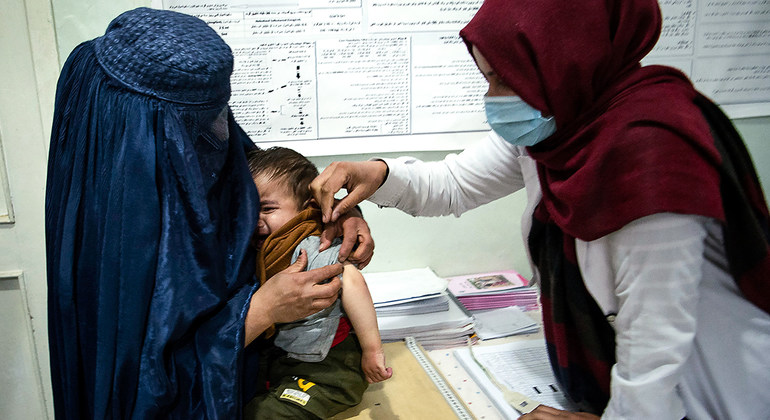“We have only a few days of supplies left and we’re exploring all options to bring more medicines into the country,” said Dr. Richard Brennan, Regional Emergency Director with the WHO Office for the Eastern Mediterranean (EMRO), speaking on Friday during the bi-weekly briefing by UN agencies.
Pakistan is supporting efforts to fly in humanitarian supplies, and most likely through the airport in the northen city of Mazar-i-Sharif, he said, with the first flight hopefully leaving in the coming days.
The World Food Programme (WFP) is also establishing a “humanitarian air bridge” from Islamabad, with flights also expected to take off soon.
Getting off the ground
Prior to the attack, WHO had planned three airlifts of trauma kits, emergency health kits, essential medicines and supplies for hospitals and health centres in Afghanistan, but the items remained grounded due to security and operational issues at the Hamid Karzai International Airport.
The blasts on Thursday targeted Afghans fleeing the country in the wake of the Taliban takeover, and military personnel securing the area. More than 160 people were killed, according to media reports. The Islamic State in Khorosan Province (ISKP) has claimed responsibility.
The UN condemned the attack, and has stressed the critical importance of the airport for facilitating the entry of aid workers and humanitarian relief. Although around 97 per cent of the roughly 2,200 health facilities in Afghanistan are functioning, they are running short of supplies to treat people affected by conflict, displacement, drought, malnutrition, and the COVID-19 pandemic.
“Because of security concerns and several other operational considerations, Kabul airport is not going to be an option for the next week at least,” said Dr. Brennan, who is based in Cairo.
“One of the challenges we have in Afghanistan right now is there’s no Civil Aviation Authority functioning. But we are working with the Pakistanis, particularly in the context of Mazar-i-Sharif Airport, because they can work with contacts on the ground to ensure that all the necessary steps to land an aircraft, to land a cargo aircraft, can be put in place”.
He added that insurance costs for bringing an aircraft into Afghanistan have “skyrocketed” overnight, reaching prices never seen before.
“We’re trying to jump through that hoop at the moment. Once we can address that, we will hopefully be airborne in the next 48 to 72 hours”.
Treating attack victims
The terrorist attack has accelerated tensions and volatility in a country where nearly half the population, or 18 million people, were already dependent on humanitarian aid. An ongoing UN appeal for $1.3 billion is less than 40 per cent funded.
Asked about the impact the attack has had on hospitals, Dr. Brennan reported that a WHO partner, the Italian NGO Emergency, which runs a trauma hospital in Kabul, has been “overwhelmed” in treating victims, who reportedly number more than 200.
“Of course, getting access to supplies is urgent, and we understand that they’ve got great pressure on their supplies right now. So our proposed air shipment in the next couple of days will be bringing in more trauma kits,” he said.
Concern for women and children
The UN continues to underline its commitment to stay in Afghanistan. More than 100 international staff, and around 3,000 national colleagues, remain in the country.
WHO, which has some 700 personnel located in all 34 provinces, is especially concerned about the health needs of women and children.
The agency fears a rollback in progress made over the past two decades, which saw maternal mortality rates drop by roughly 60 per cent and child mortality by around 50 per cent.
Even though Afghanistan falls short of international standards in availability of doctors and nurses for its population, thousands of health professionals were also trained during this period, including women doctors, nurses and midwives.
Health worker ‘brain drain’
“Already we’re hearing that some female health workers are not attending work, and that there has been a decline in the attendance of women and children at some facilities,” said Dr. Brennan.
“This again highlights the need to ensure the availability of medical supplies to support female health workers in their work, and to encourage families to bring their mothers, females, girls, and children, to seek health care when they need it.”
Asked why women health workers were reluctant to go to work, Dr. Brennan said WHO assumed they were being cautious as the agency had not received any reports about physical or other restrictions blocking women from their jobs.
Thousands of Afghans have been fleeing abroad since the Taliban took over, and Dr. Brennan noted that health workers are also part of this “enormous brain drain”.
UN commitment to stay
Looking ahead, WHO will be working with donors, partners and the Afghan health authorities in the coming weeks to ensure continued support for the country’s health system.
“For the past week or so, the eyes of the world have been focused on that major air operation at Kabul airport. But once that evacuation mission ends, the enormous humanitarian needs will continue and our work will then enter a new phase which will bring complexities on a scale that we have not seen before,” said Dr. Brennan.
“In spite of these challenges, WHO and the UN will be there for the people of Afghanistan.”




